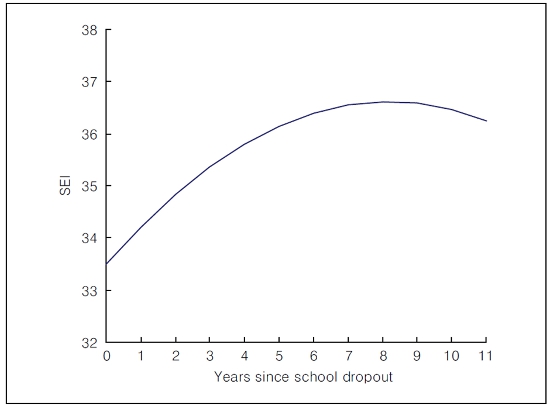 Every year, more than a million students leave high school without a diploma, with one-half becoming employed in low-wage ‘dead-end’ jobs. How can the employment prospects of these young people be improved? In new research Kyung-Nyun Kim finds that neither low wage work experience nor gaining a General Educational Development certificate is enough for them to move into better occupations. Instead, he argues that dropouts should seek vocational qualifications which will signal to employers that they have the training and capacity to move into better work.
Every year, more than a million students leave high school without a diploma, with one-half becoming employed in low-wage ‘dead-end’ jobs. How can the employment prospects of these young people be improved? In new research Kyung-Nyun Kim finds that neither low wage work experience nor gaining a General Educational Development certificate is enough for them to move into better occupations. Instead, he argues that dropouts should seek vocational qualifications which will signal to employers that they have the training and capacity to move into better work.
Each year in the U.S, more than a million students leave high school without a diploma, and the rate of high school dropouts is a continuous source of social concern. Despite tremendous efforts, in recent years the problem has not substantially improved. Likewise, one half of all dropouts are employed in low-wage jobs, in which advancement is not attainable; as a result, they often become welfare recipients. Intuitively, one method to improve their life chances would be to improve their educational credentials. However, in new research, I argue that dropouts’ labor market benefits lie in obtaining occupational skills, not educational credentials. Thus, school dropouts need to be redirected toward hidden credentials, such as vocational certificates instead of the General Educational Development (GED).
School dropouts are typically portrayed as having low wage or secondary jobs. If these young workers are not attached to their jobs, would increasing human capital through work experience, a GED diploma or vocational credentials provide a real opportunity to improve their occupational prospects? Given that there is a socioeconomic nature to finding employment, such social constraints as gender, family background and race may create different opportunity structures for dropout workers. Does the human capital building process in dropout workers compensate for the influence of social constraints on occupational standing? I sought to answer these questions by examining data covering nearly 9,000 respondents in The National Longitudinal Study of Youth 97 from 1997 to 2008.
Work experience is considered an important mechanism for accumulating human capital via learning-by-doing. However, occupations in the secondary market tend to be entry-level jobs involving standardized and repetitive work, and mundane or demeaning activities requiring minimal skills. Once hired in the secondary market, workers may be trapped there, regardless of their length of work experience, where employers value prospective employees’ attitudes more. Placing the priority between skill building via education or training and labor market attachment via job placement has been controversial in welfare discussions. According to job-placement-first views, work experience will lead to better economic outcomes regardless of job decency. However, Figure 1 demonstrates that work experience contributes little to help workers dropout workers move up from their lower occupational standing. This implies that most dropout workers are likely to be stuck in dead-end work for a considerable time. With a low annual growth rate of occupational standing and its decline over time, it would not be plausible for the average dropout worker to escape from their low status. Work experience cannot be a mechanism for dropouts to move into a better occupation.
Figure 1- Predicted Trajectory of Dropouts’ Occupational Standing.

Note: SEI stands for a degree of prestige or social standing of occupation
Obtaining a GED diploma is a common intervention to enhance dropouts’ resiliency and self-supporting capacity, but there has been considerable disagreement as to its effects on disadvantaged workers. I argue that the GED is not conducive to increasing occupational standing, even though most dropouts pursue them compared to vocational certificates. A GED only signals that those who hold them have more ability than other dropouts, and its positive economic benefits are due to self-selection toward GED certification by ability. This means that the preparation for GED tests does not lead to sufficient educational activities in order to enhance work performance and thereby provide economic benefits.
Nonacademic credentials, such as vocational certificates, have been of little interest in the U.S. A vocational certificate is given to a person who has passed a test following course work, signifying a trained capacity for certain skills or knowledge as well as the holder’s capability. Dropouts are only qualified for 12 percent of jobs. Thus, by gaining a vocational certificate, dropouts may be able to substantially expand their employability. Vocational certification provides the momentum needed to avoid the most unprivileged jobs by allowing greater access to higher-status roles. In light of the fall in the earnings of high school graduates compared to college graduates over the past three decades, if they are not seeking a college education, their labor market benefits lie in obtaining occupational skills, not educational credentials. To improve the career development of dropout workers, a policy intervention which improved workers’ accumulation of human capital through vocational certificates, could be a better option for dropouts than measures encouraging them to to obtain a GED.
Social constraints as gender and race create different opportunity structures for dropout workers’ vocational certificate. Women generally have relative disadvantage in occupational standing to that of men, so gaining vocational certificate is of greater benefit in comparison. Even though women’s’ acquisition of a vocational certificate is also concentrated on limited fields, such as healthcare, office work and cosmetology, gaining one may help female workers to get out of gender-stereotyped service jobs, such as cashiers, waitresses and janitors and also allows them to work more flexibly.
Minority disadvantages in the achievement of occupational standing have also been documented. Occupational inequality due to racial discrimination can be lessened by bringing out minorities’ hidden human capital through gaining a vocational credential. However, for Hispanic workers, the acquisition of a vocational certificate does not give as much advantage as it does for White workers. One possible interpretation is that Hispanic workers may obtain certificates in less rewarding fields than their White counterparts. This interpretation is supported by research which shows that Hispanic workers are overrepresented in menial jobs, such as in the construction industry. Another possible interpretation is that even though holding a certificate can send a positive message to employers about workers’ productivity, the disadvantage of Hispanic workers could be due to barriers to job entry which workers are trying to overcome by gaining a vocational certificate.
This article is based on the paper, ‘Occupational Constraints and Opportunities Faced by School Dropouts’, in Education and Urban Society.
Featured image credit: photologue_np (Flickr, CC-BY-2.0)
Please read our comments policy before commenting.
Note: This article gives the views of the author, and not the position of USApp– American Politics and Policy, nor of the London School of Economics.
Shortened URL for this post: http://bit.ly/1HPyDLP
______________________
 Kyung-Nyun Kim – Ewha Womans University.
Kyung-Nyun Kim – Ewha Womans University.
Kyung-Nyun Kim is a Deputy Director at the Korean Ministry of Education and is Adjunct Professor at Ewha Womans University. His Research Focuses on the Relationship between Education, Work, and Social Mobility.






